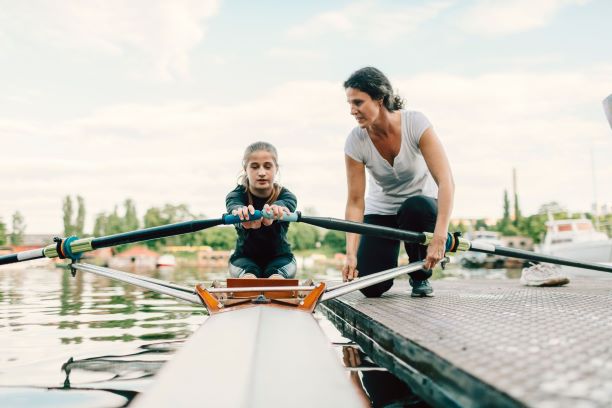Quebec Rowing innovates with competition restructuring
 Rowing is undergoing a cultural shift in Quebec.
Rowing is undergoing a cultural shift in Quebec.
Until recently, there weren’t many opportunities for rowers under the age of 14. Competitions often required extensive and expensive travel, but didn’t provide athletes with meaningful match-ups or much time on the water. The Long-Term Development infrastructure required to provide quality sport experiences simply wasn’t there yet, though there were plenty of people interested in getting involved. That’s when the Association Québécoise d’Aviron (AQA) began looking at restructuring their competitions.
“We took an approach that was analytical, looking at the current competition structure nationally and provincially and then working to create something completely different,” said Brent Figg, High Performance Development Coach for AQA.
“We embraced a new approach to prioritize racing but also at the same time be more inclusive and carbon-neutral and local.”
Figg worked closely with AQA Head Coach Gavin McKay to flesh out a new competition structure for the sport starting in 2017. They had previously identified that some of their highest level athletes still weren’t using appropriate movements, so they invented an event called the Skills Row-deo that completely transformed the traditional style of competition.
“We included a time trial element where all ages and all levels of development could compete, then we used the time trial to group them based on speed. The focus was on putting them in situations where they were competitive regardless of age, gender and boat class,” he said.
These changes had been originally identified during the Rowing Canada Aviron (RCA) competition review in 2008. Some of the recommendations stemming from that had been implemented, but not all of them, and not consistently across the country. The first time they implemented some of these changes in the Quebec racing circuit, Figg was thrilled to receive positive feedback from the athletes — not only were they having more fun because the competition was more meaningful, they felt there were more opportunities for building camaraderie while reinforcing proper skill development.
“That felt like a real cultural shift,” he said.
Using Sport for Life resources such as the paper Competition is a Good Servant but a Poor Master by sport scientist Istvan Balyi, as well as RCA’s competition review, AQA began building a vision for the sport’s future. Figg and MacKay set out to identify when money and resources were being diverted to the wrong area, what Long-Term Development adjustments they could make to their physical space to be more conducive to keeping athletes engaged, and how to prioritize and emphasize skills development at the appropriate stages.
“We wanted to be spending our time teaching people how to be safe, competent and skilled. And that, of course, leads to loving the sport. It was about developing a feel for the water, and safety was paramount. Before we put a lot of emphasis on physiology, but there wasn’t enough emphasis on appropriate rowing movements,” said Figg.
As they introduce more local events to the competition structure, Figg believes that will make the sport more accessible and enjoyable to everyone. And by varying the race length from 2000 metres, introducing new races that are 500, 750 and 1000 metres long, respectively, it creates a better environment for onlookers.
“By reducing the length of the race, not only were we offering pedagogically appropriate racing but the view from the shore was also incredible. I went from largely watching a boat parade, which is what the majority of events in North America are like, to watching races that were decided by only a couple of feet between five or six competitors,” he said.
“To see that in the first rounds was extremely eye-opening and exciting to watch.”
While Figg began introducing these changes to the competition structure, it was MacKay’s job to get parents and stakeholders on side with the innovations. Establishing the political will was key to their success, and at times they had to take measured risks.
“Gavin had the fortitude to forge ahead and to advocate on behalf of our improvements, and there were lots of hard discussions that needed to be had. The provincial association took on the risk of essentially owning the new events. They were in charge of oversight and delivery while I had a hand in making sure they ran. A big part of it felt like putting your foot in the fire and just doing it,” said Figg.
“Part of the philosophy for me is that when we have these competition structures, then families and athletes can prioritize investing in a true sport experience. For a sport that’s not mainstream, our challenges are about introducing the sport to the public and this is one way we’re helping that to happen. We want our athletes to stay engaged, and to feel like they’ve found the right fit.”
Sport for Life’s Director of Quality Sport Development Carolyn Trono has been keeping a close eye on the competition restructuring in Quebec, and believes their innovations and successes could inspire other organizations to rethink how to create meaningful competition experiences while developing athletes appropriately so they’ll stay with the sport for life.
“As the principles of Long-Term Development and quality sport continue to be mobilized across the country, each organization needs to take responsibility for doing the work required to effectively implement these ideas,” she said.
“Use of a Skills Row-deo puts good emphasis on the importance of learning rowing skills correctly before moving to racing. The time trial aspect of racing creates situations where athletes of similar ability compete together, again creating a meaningful and developmentally appropriate competition experience,” she said.
“It is fantastic to hear about Quebec implementing this in their rowing community.”
